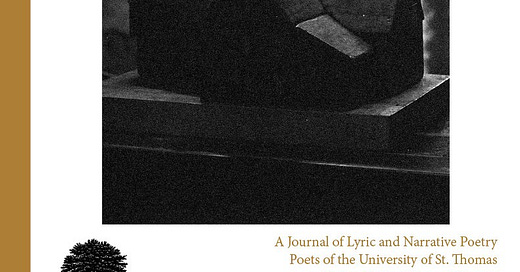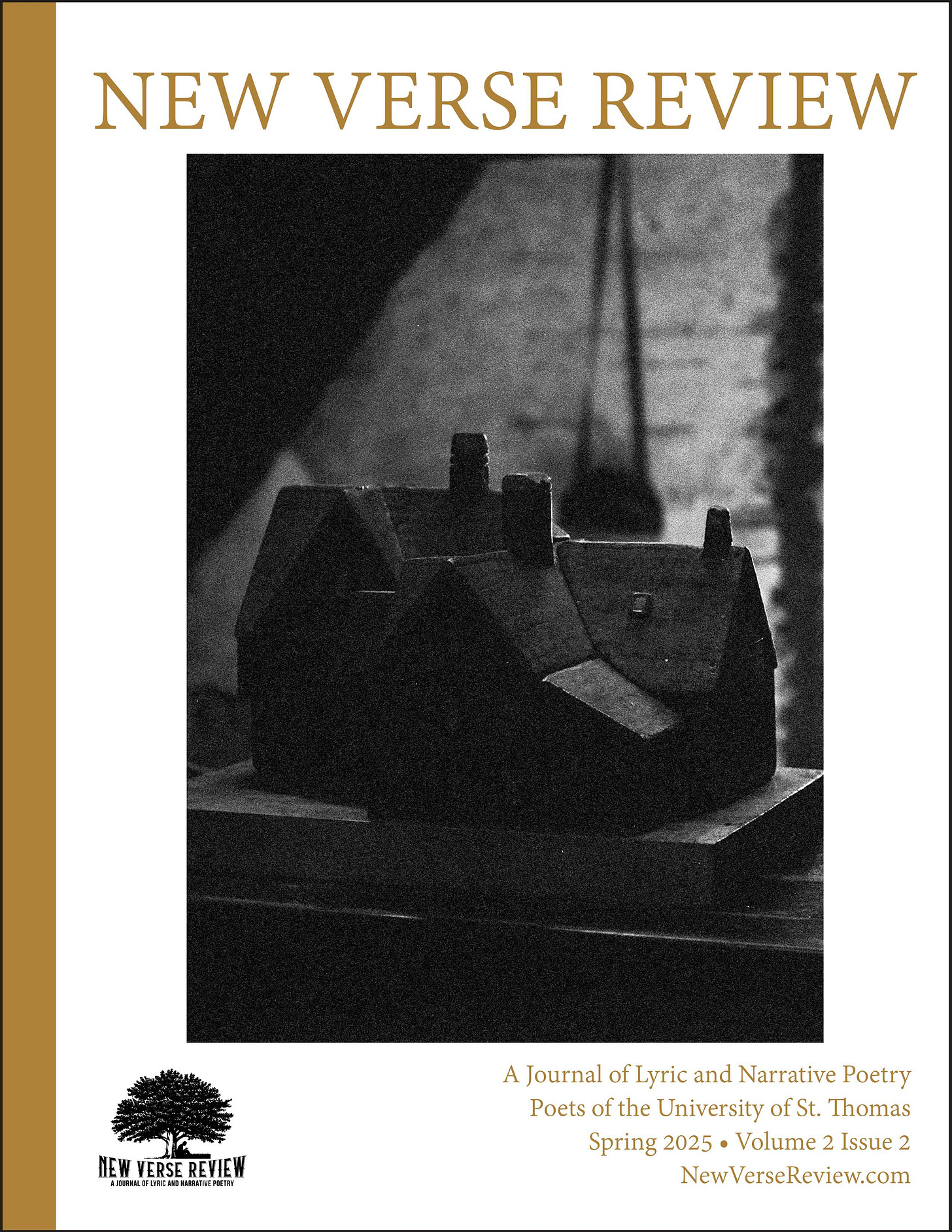Issue 2.2 Is live! Poets of the University of St. Thomas Spring 2025 Mini-Issue
Edited by D. A. Cooper and Mary Grace Mangano
Issue 2.2: Poets of the University of St. Thomas is now available at www.newversereview.com.
This issue of New Verse Review includes alumni of the MFA Program in Creative Writing at the University of St. Thomas in Houston, which graduated its first cohort of poetry students in 2023. Under the program’s founding director, James Matthew Wilson, students studied the craft of poetry, submitted and critiqued poems in workshops, and learned the art of writing in verse from masters of the tradition both ancient and modern.
We did all of this on Zoom. Or, rather, it began in our Zoom classes and then continued during the annual residency at the University of St. Thomas’s campus in the sweltering and humid Houston summers. What has formed as a result of this united study and creative undertaking is a true community, striving together to create something good. Some of the first fruits of that effort have been collected here in this special issue of New Verse Review.
This collection spans a variety of forms, verses, and themes, showcasing the diversity of voices and styles within our community, as well as the unifying spirit of our art. Readers will find a multitude of sonnets – Petrarchan, curtal, and nonce – as well as a ballade about ballet, a villanelle, rhyming couplets, quatrains, sestains, and tercets, metrical verse, alliterative verse, blank verse, and free verse. Each poem has been crafted, the way a carpenter builds a chair, or the way an architect plans a building. These poems do something and they are something.
We have organized the poems first by theme, then by poet. Several poems meditate on art and beauty – on what it means to be an artist. Others deal with death, burial, or aging. Still others contemplate nature or the nuances of family life and friendship. There are poems of light verse and religious verse. We have also chosen the collection’s “bookends” to be poems about writing. Emma Atkinson’s poem “Ephesians 2:10” begins the issue with the line, “You have called me your poem, and so I am.” We felt this a fitting way to begin a special issue showcasing a community of poets from the only MFA program “committed expressly to a renewal of the craft of literature within the cosmic scope, long memory, and expansive vision of the Catholic literary and intellectual tradition.” We conclude the issue with D.A. Cooper’s “To Read,” which has at its last line: “[...] I will find the time I need to read.” To us, this is a hopeful and fitting ending. There is so much good poetry being written and waiting to be read. We suggest starting with the poems here.
We want to thank Steve Knepper for offering us the opportunity to guest-edit this issue. We also thank James Matthew Wilson and the other members of the poetry faculty at the University of St. Thomas for their instruction and encouragement. Finally, we are pleased to say that both of us will continue serving New Verse Review as associate editors, beginning with the Summer 2025 issue.
Sincerely,
D.A. Cooper ’24 and Mary Grace Mangano ’23
Below, please find four sample poems from the issue:
“Ephesians 2:10” by Emma Atkinson
You have called me your poem, and so I am.
My form you gathered from the great abyss
Of your eternal mind—and gave it flesh
And memory with which to ponder this.
The rhythm of my being lived in you
Until you uttered it into existence
And measured every word to suit the image
Of me which haunts you with its strange resistance
To being captured or rendered by your hand.
Yet when my being wrestles with your choice,
You are not slowed or hindered in your art,
But rather, incorporate this into your voice
So that the faults and fractures in my soul
Become a testament of your control.
Emma Atkinson is a postulant at Carmel of Port Tobacco. Her poems have appeared in the St. Austin Review and Modern Age.
“The Photographer” by Maya Venters
Face half-obscured, she saw him seeing her
not how she wanted to be seen but how
she was. The heavy body held the frame
(hunched shoulders, linen hugging at the thigh)
exposing lights against the darks, small contrasts
of what she was and what appeared to be.
With each move closer, each lens changed, the gaze
peeled layers, like a lover, like a maker
discovering the details as he goes.
She let him do it: see her for an instant,
breathe too close, turn her face into the light,
finger the dial to focus his attention.
And she returned the gaze the only way
she knew, like the thing made, like the thing loved,
compelled to give some gesture of reply.
Maya Venters is a Canadian writer. Her chapbook Life Cycle of a Mayfly won the 2023 Vallum Chapbook Prize. She has published in Rattle, The Literary Review of Canada, and Modern Age, among others. Maya can be found at mayaventers.ca.
“Burial” by Jeff Young
For Robert Simpson, January 6, 2021
Red-rusted heap, the heaved earth
Stands against this grave interstice,
Between here and gone, the hereafter’s hatchway.
This plain box of plied pine
Carries you—a crowning cradle
Now handled by heavy hangers-on.
Time pools like liquid silence,
Stills the biding sorrowed guests,
Waiting. Waiting—for what?
For a release from fear?
For the writhing weight of wellness?
Like stones we stand, solemn.
Now pipers play; the priest prepares.
The soil strikes the nose like scotch,
Earthy, peaty, pine needles, pears.
At three we start. Signum Crucis.
The priest prays, intones Asperges Me,
Sprinkles water, blessing lamentations.
It’s done today as you determined.
Friends—men—manually remit
Your remains to the earth.
Hands—shoulders like wheeled pulleys—
Lower, slowly, the long straps.
You descend, our blessèd burden.
We stand our ground and gasp good-byes.
Gathered beggars, we bend, barehanded,
Clasping clumps of crimson clay
And cast them down upon your casket.
A violent love—verily and holy—
Like a weaver who severs the last thread.
Jeff Young is a poet, writer, and teacher. He is the author of Around the Table with The Catholic Foodie: Middle Eastern Cuisine (Liguori Publications, 2014) and of the Savoring Sundays column in Catholic Digest. His writing has appeared in numerous print and online journals, including Joie d’Vivre Journal, Legatus, CatholicMom.com, among others. He resides in Covington, Louisiana with his wife and children.
“Holiday” by Michael Yost
Faust: Who art thou then?
Mephistopheles: . . . Part of that Power, not understood,
Which always wills the Bad, and always works the Good.
. . . I am the Spirit that denies!
- Faust, Part I, Scene: In Faust’s Study
So little under heaven
Is sweeter than a gin
And tonic at eleven:
Wind ripples cherry skirts,
Uncovers cream-soft skin,
As she now sways, now flirts.
It is a very natural perfection,
Preventing us, at least, from disaffection.
O let Lord Bacchus’ bliss
Bless beer can’s snap and hiss,
Pent “pop” of champagne cork,
And gin cap’s crackling torque.
Let speech be lifted up,
In silver plate and cup.
Let there be cocktails on the lawn at eight,
To help us love the life we cannot hate.
O may Lord Bacchus keep
Tobacco’s tinder rustle,
Blue strand of lithe smoke’s leap;
Warm round of light-brown muscle,
Crystal’s chime in parlor,
Ring of late night laughter
— The garden lilts with whispers and brown eyes.
We are not over-righteous, over-wise —
And breathe benignities
Upon bare necks and knees;
On all meet meals, this fête
Where vanities, unhindered
View charity’s fine flindered
Candlelight, lit late.
Remember nothing. Nothing loved will last.
All feasts resolve in everlasting fast.
Michael Yost is a poet and essayist living in rural New Hampshire with his wife and children, as well as an alumnus of Thomas More College of Liberal Arts, where he works as the Director of Admissions. He earned his M.F.A. in Creative Writing from the University of St. Thomas in Houston. His essays and poems have been published in places like The University Bookman, Dappled Things, Crisis Magazine, St. Austin Review, The Brazen Head, and Hearth and Field. Follow him on his Substack: The Weight of Form.





